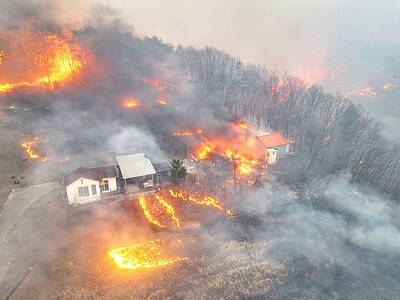Iranian President Mahmoud Ahmadinejad and his Venezuelan counterpart Hugo Chavez were scheduled to seal their economic alliance yesterday by laying the foundation stone of a joint petrochemical plant.
The two nations, both OPEC members, pledged on Sunday to boost cooperation and trade ties -- and slammed the US.
Yesterday, the final day of Chavez's trip, the two leaders were to inaugurate construction of a US$700 million methanol plant in the Asaluyeh industrial zone on the Gulf coast.
The plant, set to come on stream in four years, will have a capacity of 1.65 million tonnes of methanol a year and a similar project is planned for Venezuela, said Mohammad Hassan Peyvandi, director of planning and development for Iran's petrochemical industry.
The Venezuela plant would give Iran better access to Latin American and Brazilian markets and provide easier reach to India and Pakistan for Venezuela, the state news agency IRNA said.
"The United States is incapable of hurting Iran and Venezuela ... cooperation between the two independent states is natural and it must be expanded," state television quoted Iran's supreme leader Ayatollah Ali Khamenei as telling Chavez on Sunday.
Chavez arrived in Tehran on Saturday for a two-day visit.
"The election of anti-American governments in the [Latin American] region shows that US imperialism is weakening," Chavez said.
"Numerous oil and gas contracts between Iran and Venezuela show the two countries are serious in developing ties," he said, describing Iran as a "good model for other countries."
Ahmadinejad also called for stronger ties with Latin America.
Chavez was expected to sign 20 agreements with Iran for projects in his country.
Iran also plans to join a Latin American initiative designed to counter US-led efforts for free trade in the region, the official Web site of Iran's president office reported on Sunday.
The report said Chavez welcomed Iran's observer membership in the Cuban-Venezuelan-backed alternative to the Free Trade Area of the Americas.

DEATH CONSTANTLY LOOMING: Decades of detention took a major toll on Iwao Hakamada’s mental health, his lawyers describing him as ‘living in a world of fantasy’ A Japanese man wrongly convicted of murder who was the world’s longest-serving death row inmate has been awarded US$1.44 million in compensation, an official said yesterday. The payout represents ¥12,500 (US$83) for each day of the more than four decades that Iwao Hakamada spent in detention, most of it on death row when each day could have been his last. It is a record for compensation of this kind, Japanese media said. The former boxer, now 89, was exonerated last year of a 1966 quadruple murder after a tireless campaign by his sister and others. The case sparked scrutiny of the justice system in

A French-Algerian man went on trial in France on Monday for burning to death his wife in 2021, a case that shocked the public and sparked heavy criticism of police for failing to take adequate measures to protect her. Mounir Boutaa, now 48, stalked his Algerian-born wife Chahinez Daoud following their separation, and even bought a van he parked outside her house near Bordeaux in southwestern France, which he used to watch her without being detected. On May 4, 2021, he attacked her in the street, shot her in both legs, poured gasoline on her and set her on fire. A neighbor hearing

DITCH TACTICS: Kenyan officers were on their way to rescue Haitian police stuck in a ditch suspected to have been deliberately dug by Haitian gang members A Kenyan policeman deployed in Haiti has gone missing after violent gangs attacked a group of officers on a rescue mission, a UN-backed multinational security mission said in a statement yesterday. The Kenyan officers on Tuesday were on their way to rescue Haitian police stuck in a ditch “suspected to have been deliberately dug by gangs,” the statement said, adding that “specialized teams have been deployed” to search for the missing officer. Local media outlets in Haiti reported that the officer had been killed and videos of a lifeless man clothed in Kenyan uniform were shared on social media. Gang violence has left

‘HUMAN NEGLIGENCE’: The fire is believed to have been caused by someone who was visiting an ancestral grave and accidentally started the blaze, the acting president said Deadly wildfires in South Korea worsened overnight, officials said yesterday, as dry, windy weather hampered efforts to contain one of the nation’s worst-ever fire outbreaks. More than a dozen different blazes broke out over the weekend, with Acting South Korean Interior and Safety Minister Ko Ki-dong reporting thousands of hectares burned and four people killed. “The wildfires have so far affected about 14,694 hectares, with damage continuing to grow,” Ko said. The extent of damage would make the fires collectively the third-largest in South Korea’s history. The largest was an April 2000 blaze that scorched 23,913 hectares across the east coast. More than 3,000